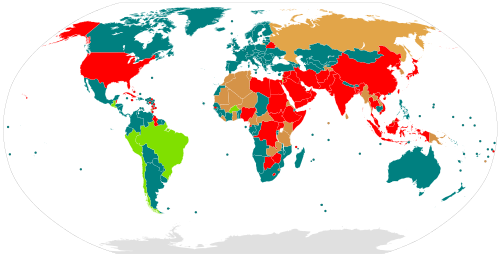Capital punishment
![]()
This article is about the death penalty. For the story by Georges Simenon, see The Death Penalty; for the TV crime thriller, see Crime Scene: Death Penalty.
The death penalty is the killing of a person as a legal consequence for a specific offence defined in a law of which he has been found guilty. It is usually preceded by a death sentence after a trial, which is generally carried out with the execution of the convicted person. Therefore, the person is said to have been sentenced to death.
For millennia, people have been executed whose acts are considered particularly serious crimes according to codified penal provisions. From the 18th century onwards, the legality of this practice was questioned in Europe and some states abolished the death penalty. The first state was the Grand Duchy of Tuscany in 1786 under Leopold II; his brother Emperor Joseph II abolished capital punishment in the Austrian hereditary lands the following year. Its general abolition was called for in France in 1795. Since 1945, the death penalty has been abolished by more and more states; among them the Federal Republic of Germany with Article 102 of the Basic Law, Liechtenstein with Article 27 of the Liechtenstein Constitution, Austria with Article 85 of the Federal Constitutional Law and Switzerland with Article 10 (1) of the Federal Constitution.
Today, the death penalty is ethically, criminally and practically controversial; it is often considered incompatible with human rights. Many non-governmental organisations are campaigning for its worldwide abolition. As a step towards this goal, the United Nations General Assembly has been calling for a worldwide moratorium on executions since 2007.

Status of the death penalty in all states: abolished entirely only in special criminal proceedings (e.g. martial law) Stop Execution applied
Definition
The death penalty presupposes offences defined by criminal law for which it is provided, as well as the lawful detention, conviction and sentencing of the perpetrator. The entire procedure must be carried out by authorized and legitimate representatives of a state with a valid and functioning legal system. This presupposes structures of order and rule, including a legislature and executive with a monopoly on the use of force and a constitution of some kind, which most states - regardless of their actual realization of democracy - legitimize by reference to the will of the people.
Under certain legally defined circumstances, most states also permit their executive to carry out targeted killings in acute self-defence and in state of emergency situations without prior legal proceedings and death sentences; this also applies to killing in war that is legitimized under international law. Private, non-legally authorized killings of suspected or actual criminals, for example through lynch law, are considered murder in constitutional states.
In addition to illegal executions by unauthorized persons, there are also executions by state officials with questionable or no legal basis. For example, some governments issue illegal kill orders, even in states that have banned the death penalty and signed the United Nations Charter, and execute alleged or actual opponents of the regime, terrorists or criminals without trial. Military, police or secret service representatives, as well as death squads, may act on their own authority, for example because the government does not enforce existing laws, invoke an alleged situation of self-defence and subsequently receive state backing for this. Such extra-legal, summary and arbitrary executions are judged by rule-of-law standards as judicial murders. The difficult distinction between legal death sentences and killings on an unsecured legal basis contributes to the fact that the death penalty as a whole is questioned ethically and socio-politically.

Cesare Beccaria, Dei delitti e delle pene
Offenses
The death penalty, enshrined in ordinary criminal law, is usually imposed for murder. In some states, other direct and indirect crimes against life and limb of persons are also punishable by death:
- Bank Robbery (Saudi Arabia),
- Kidnapping (Saudi Arabia),
- Human Trafficking (People's Republic of China),
- Robbery resulting in death (United States),
- Rape (China, Saudi Arabia), rape resulting in death or when the victim falls into a permanent coma (India),
- child sexual abuse (China and Indonesia),
- Drug trafficking or possession above a certain quantity (Indonesia, Saudi Arabia, Malaysia, Singapore, Thailand, Republic of China (Taiwan)),
- illegal use of firearms (Singapore),
- terrorist attacks on oil and gas pipelines (India), terrorist attacks (Cameroon, United Arab Emirates).
Economic offenses punishable by death are:
- Bribery of public officials (Iraq until the fall of Saddam Hussein in 2003),
- Corruption (China, Iran),
- illegal manufacture and sale of alcohol (India).
Iraq punished with death until 2003:
- public insult to the president,
- dual membership in political parties,
- Prostitution.
In some Islamic states, the following are considered offenses worthy of death:
- Adultery (Saudi Arabia, Iran, Afghanistan, United Arab Emirates, Brunei),
- Homosexuality (Qatar, Iran, Yemen, Nigeria, Saudi Arabia, Somalia, United Arab Emirates, Brunei),
- Pimping (Saudi Arabia),
- Renunciation of the Islamic faith (Afghanistan, Iran, Yemen, Qatar, Mauritania, Pakistan, Saudi Arabia, Somalia, United Arab Emirates, Maldives, Brunei),
- Blasphemy,
- Witchcraft (Saudi Arabia).
Many states punish the following offenses by death under their laws of war:
- Treason,
- Treason,
- Espionage,
- Sabotage,
- Desertion.
Questions and Answers
Q: What is the death penalty?
A: The death penalty is a form of capital punishment where a government or state executes (kills) someone, usually but not always because they have committed a serious crime.
Q: What are some examples of countries that have the death penalty?
A: Examples of countries that have the death penalty include the United States, China, Japan, Indonesia and Iran.
Q: What are some examples of countries that do not have the death penalty?
A: Examples of countries that do not have the death penalty include Canada, Australia, Mexico and all members of Council of Europe.
Q: How many countries are considered abolitionist in practice?
A: 28 countries can be considered abolitionist in practice. Countries are considered abolitionist in practice if they retain the death penalty in law but have not carried out any executions for the past 10 years or more.
Q: For what types of crimes is the death penalty used?
A: Most of the countries that have a death penalty use it on murderers, and for other serious crimes such as rape or terrorism. Other countries especially ones with Authoritarian or Totalitarian governments may also use it for smaller crimes like theft, drugs, or for saying bad things about the government.
Q: How often does execution occur in most countries?
A: Executions in most countries have become rarer in recent centuries.
Search within the encyclopedia